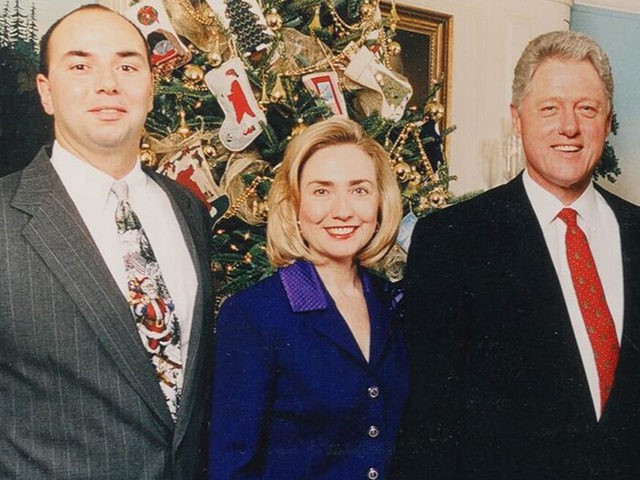Gary Byrne appeared on Tuesday morning’s Breitbart News Daily with SiriusXM host Stephen K. Bannon to discuss his new book Crisis of Character: A White House Secret Service Officer Discloses His Firsthand Experience with Hillary, Bill, and How They Operate.
He offered a detailed response to those who have questioned how an officer in his position could have observed all of the incidents he describes in the book, beginning with a review of the ground rules for his job as a uniformed Secret Service agent.
He said the fixed positions of the White House security detail “have been there for fifty years, and the uniformed division mans them 24 hours a day.”
“My post was E6, right outside the Oval Office,” he said, having worked his way up to that sensitive position after serving on perimeter detail and the fence line during the first Bush Administration. “You have to train with senior officers to work in the West Wing posts, or the internal posts — West Wing, mansion, those type of things. They train you over weeks, and they report back to your supervisors and their supervisors — you know, this guy’s smart, he’s squared away, he’s diligent, he’s paying attention.”
Byrne advanced to the interior detail during the Administration of George H.W. Bush, or “Papa Bush” as the agents called him. He said the Bush White House was run “like a Swiss watch,” as befits a President who served in World War II as a naval aviator and was formerly director of the CIA.
“Suit and tie, diligent, professional all the time,” he recalled. “His White House worked very well… he’ll probably forget more than most Administrations are ever gonna know, unfortunately. He was a very squared-away guy, and so was a lot of his staff.”
Byrne worked security at events across the country during the 1992 presidential campaign, at which he “started to get a taste of how things were going to change” in the Clinton White House.
“Some of it was good, and a lot of it wasn’t,” he said. “You’ve got a lot of young people, which is common in campaigns, and it’s good, but as they move up in position, they kind of get this air of arrogance, and pretty soon they think that the Secret Service is just a hindrance. We have a lot of procedures, they have a very important job to do, and sometimes it’s hard to get these people on board, so to speak.”
After the Clintons moved into the White House, Byrne returned to his position outside the Oval Office. “This is what a lot of people don’t know, especially these retired agents that are bashing me: there’s a book that sits on that post, it’s about three inches thick, and you’re responsible to know everything in that book. We call it the Green Monster,” he explained. “The reason you’re there is if the President decides to walk out of the office, when he’s sitting there reading classified information, and his staff isn’t there or doesn’t pick it up, your job is to go and secure that information. Your job is to make sure that whatever is sitting on the desk cannot be seen by anybody else.”
Byrne said his duties certainly did put him in position to observe the incidents he recounts in his book, contrary to the denunciations from some veteran Secret Service agents — who, Bannon noted, strain credulity when they claim not to know who Byrne is, since his court testimony in the Clinton affair made him well-known in the Nineties.
Byrne praised the agents and plainclothes special agents he’s worked with as “good guys,” but added that “the Secret Service, as a group, as an institution, has an issue with the way they manage their people.”
“They’re so vindictive,” he said. “Now, this gentleman that’s come out and said what I’m saying is not true and there’s no way I could see it — he’s speaking from his ego.” He clarified that the special agents and senior agents didn’t like to admit that lower-ranked uniformed agents could see things they were unaware of, although he hastened to add that senior Secret Service agents treated him very well personally when he was on duty at the White House.
Byrne wanted to make it clear that he didn’t write Crisis of Character to settle any old scores with Secret Service officials. He explained that he made the decision on his own without involving other Secret Service agents from the Clinton Administration because he knew how “retaliatory” the Secret Service is.
“I left them out of it. They were stunned when they found out. Some of them were kind of mad and pissed off, but I wanted to give them deniability,” he said. “Nobody knew about it but me and the three or four people that were working on the book with me.”
Byrne said he relied on “memories, notes, and memorabilia” instead of consulting with other agents because he wanted to protect them from the sort of blowback he is experiencing now. He knew many of them would be reluctant to betray the assumption of confidence between the Secret Service and its protectees.
“These guys that are criticizing me, let me ask them something: if they were on a protection detail, and you saw a protectee accidentally kill somebody, a child, would you not come forward, if they tried to hide it? When do you draw the line?” he said.
Breitbart News Daily airs on SiriusXM Patriot 125 weekdays from 6:00 a.m. to 9:00 a.m. Eastern.
LISTEN:

COMMENTS
Please let us know if you're having issues with commenting.